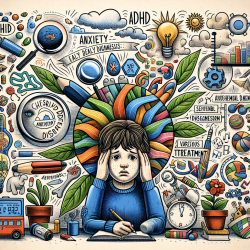In recent years, the intricate connections between climate change, human health, and social stability have become increasingly apparent. As a practitioner in the field of environmental health or therapy services, understanding these linkages can significantly enhance your ability to provide effective care and support. This blog post explores key insights from the research article "Climate Change, Human Health, and Social Stability: Addressing Interlinkages" and offers practical advice on how practitioners can leverage this knowledge to improve their skills and outcomes.
The Framework: Linking Climate Change to Health and Stability
The research provides a conceptual framework that integrates health outcomes and health systems into the broader context of climate change and social instability. This framework highlights how natural resource shortages, infectious disease outbreaks, and migration are interconnected with climate change impacts. For practitioners, this means recognizing that environmental factors can exacerbate health issues and contribute to social instability.
Key Takeaways for Practitioners
- Holistic Understanding: Develop a comprehensive view of how climate-related stressors affect health outcomes. This includes understanding how extreme weather events can disrupt healthcare services or lead to increased demand for mental health support.
- Interdisciplinary Collaboration: Work closely with experts in political science and economics to deepen your understanding of climate-related stressors. This collaboration can help identify potential areas where intervention might mitigate negative impacts on health and stability.
- Proactive Adaptation: Encourage adaptive management strategies within health systems to anticipate and respond to emerging health issues related to climate change. This may involve advocating for policies that prioritize resources for vulnerable populations.
Implementing Research Outcomes in Practice
The research emphasizes the need for models that incorporate the many linkages between climate change, human health, and social instability. As a practitioner, you can implement these outcomes by:
- Educating Yourself: Stay informed about the latest research on climate change and its impact on human health. Attend conferences, webinars, or workshops that focus on these topics to expand your knowledge base.
- Advocating for Policy Change: Use your position to advocate for policies that address the root causes of social instability related to climate change. This could involve supporting initiatives that improve access to healthcare or reduce environmental hazards.
- Enhancing Community Resilience: Work with local communities to develop resilience strategies that address both immediate health needs and long-term sustainability goals. This might include creating educational programs about climate adaptation or supporting community-based health initiatives.
The Role of Online Therapy Services
TinyEYE's online therapy services can play a crucial role in addressing some of the challenges posed by climate change. By providing remote access to therapy services, we can help ensure continuity of care during extreme weather events or other disruptions caused by climate-related factors. Additionally, online platforms allow us to reach underserved communities that may be disproportionately affected by these changes.
Encouraging Further Research
The research underscores several unanswered questions about the pathways linking climate change, human health, and social stability. As practitioners, we should encourage further research in this area by collaborating with academic institutions or participating in studies that explore these complex relationships.










